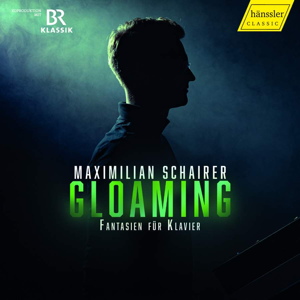
Gloaming – Fantasias for Piano
Franz Schubert (1797-1828)
Fantasia in C major, D760 Wanderer (1822)
Felix Mendelssohn (1809-1847)
Fantasia in F sharp minor, Op. 28 Sonate écossaise (1828/2189)
Ludwig van Beethoven (1770-1827)
Piano Sonata No. 14 Sonata Quasi una fantasia in C sharp minor, Op. 27, No. 2 Moonlight (1801)
Fantasia Sonata in D major, (c. 1793), Unv 12
Maximilian Schairer (piano)
rec. 2022, Historischer Reilstadt, Neumarkt in der Oberpfalz, Germany
Hänssler Classic HC22020 [60]
A recipient of several performance awards both at home and abroad, Stuttgart-born pianist Maximilian Schairer is a Young Steinway Artist, sponsored by BR Klassik. Fascinated by the piano, in 2012 Schairer undertook a professional internship at the Steinway piano manufacturing workshop in Stuttgart. He studied piano and historical keyboard instruments in Stuttgart, Leipzig, and Munich, and is continuing his piano studies with Michael Hauber, professor of at HMDK Stuttgart.
Schairer has now released his first solo recording containing four piano works written in fantasy form – a genre in which a composer’s musical imagination can flourish, unencumbered by restrictions of form. He has chosen fantasias on the theme of twilight or dusk by Schubert, Mendelssohn and Beethoven ranging from one so universally popular to another rarely heard.
Schubert’s Fantasia in C major, D760 from 1822, known as the Wanderer Fantasy (Wandererfantasie) is one of several he wrote in his career. He uses themes and bases the score on the character and meaning of his song Der Wanderer, D. 489 set to a text written by poet Georg Philipp Schmidt and is an early example of the cyclical form frequently employed in Romantic works. Schairer has declared that while preparing this score it ‘grew close to my heart! I have so many favorite passages, it’s difficult to pick one.’ The grandiose opening is one that I have always felt was too brash for such a refined and lyrical composer as Schubert. Here Schairer copes well with the writing of wide contrasts. For me, a highlight is the Adagio which is followed by a set of seven variations where Schairer’s playing is poised, expressive and lyrical yet bleakness at its the close.
Mendelssohn’s Fantasia in F sharp minor from 1828/29 was inspired by Scotland as it was described by Sir Walter Scott and named the Sonate écossaise (Scottish Sonata). After revising the score Mendelssohn kept the title, but when it was published in 1834, that title was omitted. The stand-out movement is the closing movement Presto; Schairer excels in its vital, highly-strung turbulence and its dramatic Coda.
By far the best-known work on this album is Beethoven’s Piano Sonata No. 14, which has the name Sonata Quasi una fantasia written on the score. Writer and music critic Ludwig Rellstab, from the influential Rellstab family of music publishers, likened the glorious first movement to a moonlight boat trip on Lake Lucerne, and subsequently the sonata has become known as the Moonlight Sonata (Mondscheinsonate). Schairer’s performance is top-drawer, especially the world famous first movement Adagio sostenuto that for me evokes a deep lingering sorrow. Admirable, too, is Schairer’s bold and energetic playing of the squally Finale: Presto agitato.
Beethoven’s Fantasia Sonata in D major,thought to have been written around 1793,is little known. The unfinished score was unearthed in the Johann Nepomuk Kafka Sketch Collection (Skizzenbuch) a miscellany of Beethoven works at various stages of completion or fragments now conserved and held at the British Library. Cees Nieuwenhuizen reconstructed it and it was printed for the first time in 2012. This is a persuasive account; Schairer’s playing is both fresh and ebullient.
Schairer is not fazed by these glorious works, three of which are masterworks of the piano repertory. Schairer’s affection for these early Romantic works is evident. His range of keyboard colour is highly satisfying and his approach to tempi and dynamics is creditably judged. Nevertheless, I find myself wishing for greater imaginative freedom together and a less cautious application of rubato. Schairer has provided his own informative and worthwhile liner notes. He shows real promise with this highly enjoyable solo debut album.
Michael Cookson
Help us financially by purchasing from





















